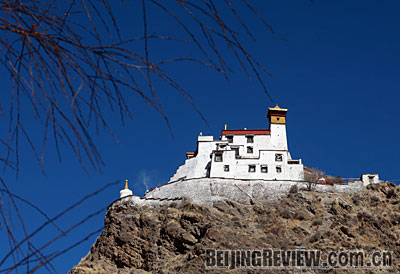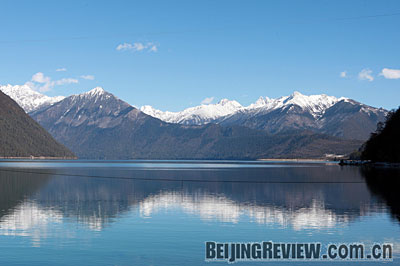
Yumbolhakang, Tibet's first royal palace built in 200 B.C, photo by Jiang Xiaoying.
The Tibet Autonomous Region, covering 1.2 million square km in the southwest part of China, is situated on the Qinghai-Tibet Plateau, often described as the "roof of the world." About 4,000 meters above sea level, it is the highest region in the world.
Tibet has a population of over 2.8 million, 95 percent of whom are Tibetans. The majority of the people are Tibetan Buddhists. Religion and spirituality are extremely important to the Tibetans and have a strong influence over all aspects of their lives.
The Tibetan Plateau is the source of several of the world's major rivers, including the Yangtze, Yellow, Mekong and Salween rivers.
The air is very dry for nine months of the year with low pressure and limited oxygen. The best season to travel to Tibet is summer, although winter has its own charm and the added advantage of travel reductions and lower admission fees to places of interest.
Where to go?
- Lhasa
A city with a history of 1,300 years and usually the first stop of all travelers. It is the most sacred city in the heart of Tibetans as it is home to important Tibetan Buddhist sites like the Potala Palace, Jokhang Monastery.
Three important monasteries of the Gelug (Yellow sect) sect of Tibetan Buddhism to see are Zhaibung Monastery, Sera Monastery and Gandain Monastery.
Barkor Street is an ideal place for buying Tibetan souvenirs, while those looking for cultural entertainment can find it at Langma Hall, a bar-like venue where local residents sing and dance.
- Shigatse
The second biggest city in Tibet and location of the Tashilungpo Monastery, residence of the Panchen Lamas.
Sakya Monastery houses the largest volume of Tibetan Buddhist sutras in the world.
Yangzhog Yumco Lake is regarded as a holy lake in the heart of local Tibetans.
Tingri County in Shigatse is the gateway for travelers to Mt. Qomolangma.

Conggo Lake in Nyingchi, a freshwater lake, is 3,700 meters above sea level, photo by Jiang Xiaoying.
- Nyingchi
Nyingchi ("throne of the sun" in Tibetan language) Prefecture is considered by many the most beautiful place in Tibet. Its elevation is the lowest in Tibet, making it a green treasure of the region. It is more humid and rich in shrubs, birch woods and pinewoods that cover the mountain slopes.
Forestry is a feature of the area, embraced by the Himalayas and Nyainqentanglha Mountains.
Yarlung Zangbo Grand Canyon in Nyingchi is a wonderland. It lies near Namjagbarwa Mountain where the Yarlung Zangbo River turns and at 496 km is one of the longest valleys in China.
- Ngari
Located in the most mystical and remote corner of the world, there are many places in Ngari where human footsteps have never been.
Travelers can visit sacred Mapam Yumco Lake as well as the ruins of the ancient Guge Kingdom.
Lhoka, Chanmdo and Nagqu are three other prefectures in Tibet, presenting unique Tibetan folk cultures.
